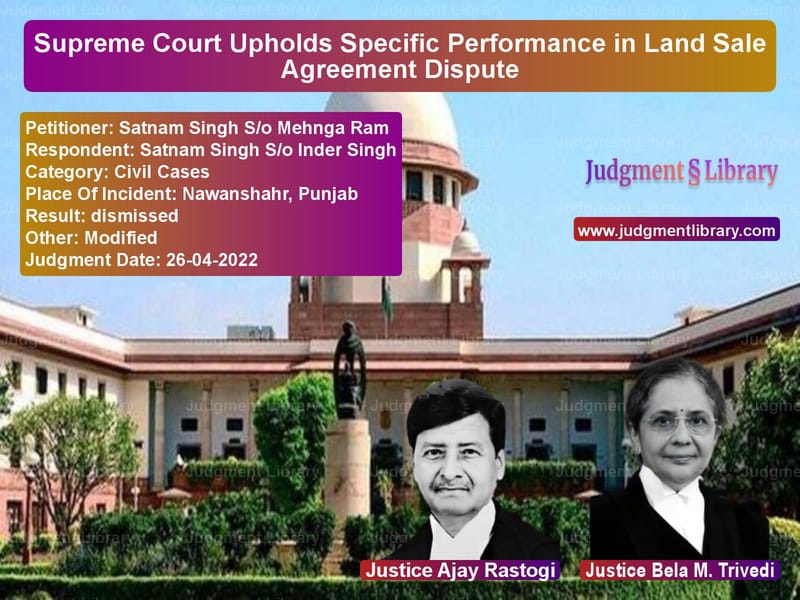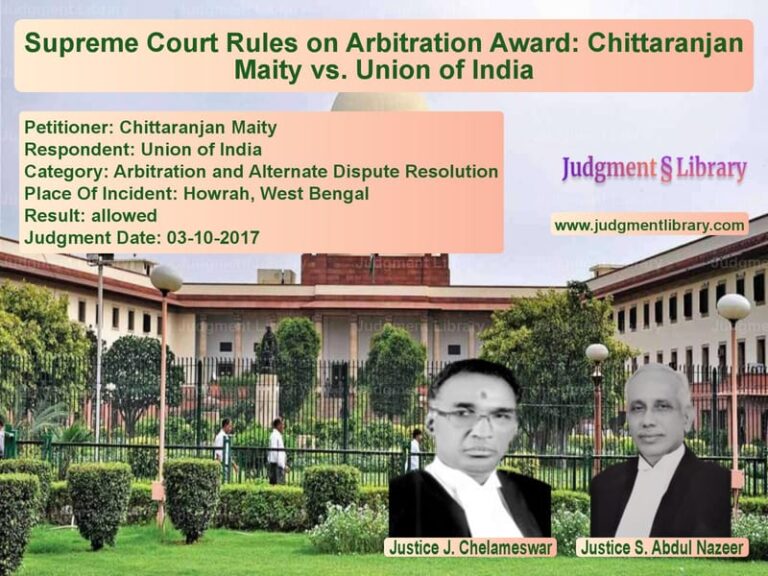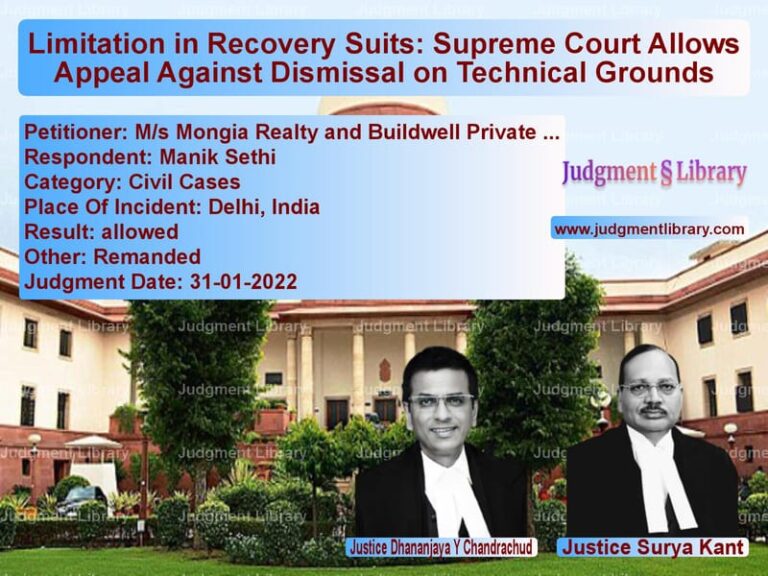Supreme Court Upholds Specific Performance in Land Sale Agreement Dispute
The Supreme Court of India, in its judgment in Satnam Singh vs. Satnam Singh, reaffirmed the principle of specific performance in land sale agreements, setting an important precedent for property disputes in India. The case involved a land sale agreement where the seller later refused to execute the sale deed, citing various reasons. The ruling clarified the enforceability of such agreements and the conditions under which a party can seek specific performance.
Background of the Case
The dispute arose over a sale agreement dated June 9, 2000, in which the appellant, Satnam Singh S/o Mehnga Ram, agreed to sell 11 kanals and 7 marlas of land to the respondent, Satnam Singh S/o Inder Singh, for a consideration of ₹2,50,000 per acre. The total sale price amounted to ₹3,54,687.50, and the respondent paid an earnest money deposit of ₹55,000 at the time of agreement. The agreement stipulated that the balance payment would be made within one year, and the sale deed would be executed upon payment.
The respondent claimed he was ready and willing to fulfill his obligations, but the appellant refused to execute the sale deed. This led to the respondent filing a civil suit for specific performance, seeking enforcement of the contract.
Trial Court Proceedings
The appellant contested the suit, raising the following objections:
- He had not executed the sale agreement and the document was fabricated.
- The agreement was a mere security document for a loan of ₹27,000 borrowed from the respondent.
- The respondent failed to issue any legal notice before filing the suit.
The Trial Court, after evaluating the evidence, ruled in favor of the respondent, holding that the agreement was genuine and that the respondent had demonstrated his readiness and willingness to perform his part of the contract. The court directed the appellant to execute the sale deed upon receiving the balance payment.
Appeals Before the High Court
The appellant challenged the Trial Court’s decision before the Additional District Judge, Nawanshahr, who upheld the ruling. The matter was then taken to the Punjab and Haryana High Court, which also dismissed the appellant’s appeal, reinforcing the lower court’s findings.
Supreme Court’s Analysis
The Supreme Court, led by Justices Ajay Rastogi and Bela M. Trivedi, examined the concurrent findings of the lower courts and observed that three courts had upheld the respondent’s claims.
“The three courts below have recorded concurrent findings of fact in favor of the respondent-plaintiff regarding his readiness and willingness to perform his part of the contract.”
1. Enforceability of the Sale Agreement
The Court rejected the appellant’s argument that the sale agreement was a security document for a loan, stating:
“The agreement in question was executed voluntarily, and the respondent had duly complied with the terms of the contract.”
2. Market Value Considerations
The appellant argued that the market value of the land had significantly increased and that enforcing the contract would cause financial loss. The Court dismissed this argument:
“Market value fluctuations cannot be a basis to deny specific performance of a legally valid contract.”
3. Readiness and Willingness
The Court examined the respondent’s actions and concluded that he had consistently demonstrated his readiness and willingness to perform:
“The respondent deposited the balance consideration and approached the courts promptly, showing clear intent to complete the transaction.”
4. Judicial Interference in Contractual Matters
The Court reiterated that judicial interference should be minimal in matters of specific performance unless compelling grounds exist:
“Courts should not rewrite contracts or allow parties to escape their obligations based on hindsight considerations.”
5. Equitable Considerations
Since the agreement was executed in 2000 and the litigation had prolonged the case, the Court directed:
- The respondent to pay an additional ₹6,00,000 as compensation.
- The appellant to handover possession of the land upon receipt of the balance payment.
- If the appellant refused, the respondent could initiate legal enforcement.
Final Judgment
- The Supreme Court dismissed the appeal.
- The Punjab and Haryana High Court’s decision was affirmed.
- The sale deed executed through the Court Commissioner in 2008 was modified to include the additional compensation of ₹6,00,000.
Impact of the Judgment
- Reaffirms the enforceability of specific performance in land sale agreements.
- Clarifies that market value appreciation cannot be a ground to renege on contractual obligations.
- Provides a precedent for courts to order equitable relief in long-pending contract enforcement cases.
Conclusion
The Supreme Court’s ruling in Satnam Singh vs. Satnam Singh upholds the principle that agreements to sell land must be honored, provided the buyer fulfills their obligations. By awarding additional compensation to balance fairness, the Court has reinforced the sanctity of contractual commitments while ensuring equity between the parties.
Petitioner Name: Satnam Singh S/o Mehnga Ram.Respondent Name: Satnam Singh S/o Inder Singh.Judgment By: Justice Ajay Rastogi, Justice Bela M. Trivedi.Place Of Incident: Nawanshahr, Punjab.Judgment Date: 26-04-2022.
Don’t miss out on the full details! Download the complete judgment in PDF format below and gain valuable insights instantly!
Download Judgment: satnam-singh-so-meh-vs-satnam-singh-so-ind-supreme-court-of-india-judgment-dated-26-04-2022.pdf
Directly Download Judgment: Directly download this Judgment
See all petitions in Property Disputes
See all petitions in Specific Performance
See all petitions in Judgment by Ajay Rastogi
See all petitions in Judgment by Bela M. Trivedi
See all petitions in dismissed
See all petitions in Modified
See all petitions in supreme court of India judgments April 2022
See all petitions in 2022 judgments
See all posts in Civil Cases Category
See all allowed petitions in Civil Cases Category
See all Dismissed petitions in Civil Cases Category
See all partially allowed petitions in Civil Cases Category







